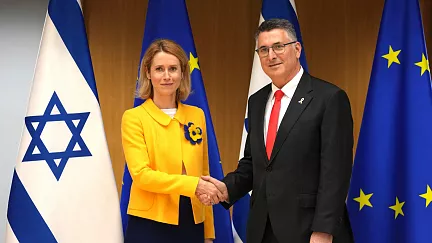
The European Union says possible sanctions against Israel remain under consideration, even after the recently brokered ceasefire in Gaza, as the bloc seeks to maintain leverage to ensure full implementation of the truce.
EU foreign policy chief Kaja Kallas made the remarks on Monday after a meeting of European foreign ministers in Brussels, saying the ceasefire had “changed the context,” but warning that the situation remained fragile.
“Unless we see real and sustained change on the ground — including more aid reaching Gaza — the threat of sanctions remains on the table,” Kallas said.
Before the ceasefire deal, brokered by U.S. President Donald Trump, Brussels had debated a package of potential punitive measures against Israel, including blacklisting certain Israeli ministers and curbing trade relations.
“We are not moving forward with sanctions now,” Kallas clarified. “But we are not taking them off the table either, because the situation could deteriorate quickly.”
She added that the EU expected Israel to take concrete steps to support the truce — including facilitating humanitarian aid, transferring withheld revenues to the Palestinian Authority, granting media access to Gaza, and re-registering NGOs operating in the enclave.
Israel, in turn, has urged Brussels to abandon sanctions talk if the EU wants to play a meaningful role in the post-war peace process.
Deep divisions among the EU’s 27 member states have so far prevented any unified move to impose sanctions.
The ceasefire, meanwhile, came under pressure on Sunday after the Israeli military launched strikes across Gaza, following the killing of two Israeli soldiers in attacks attributed to Hamas.
“The Gaza ceasefire has just faced its first major stress test,” Kallas said. “Hamas’s attacks on Palestinian civilians and its refusal to disarm are making the truce increasingly fragile.”
As the largest international donor to the Palestinians, the EU is exploring ways to bolster its role in post-war Gaza governance. Brussels has also reactivated its mission to monitor the Rafah crossing between Gaza and Egypt — though the deployment remains suspended until the route reopens.



